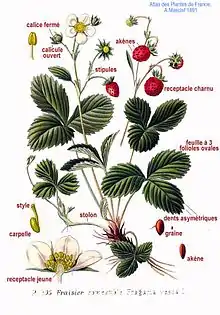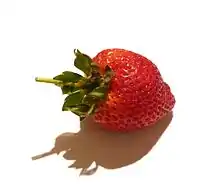Fragaria
Fragaria is the Latin name used in science for the genus of about 20 species of strawberries, plants in the rose family that grow small sweet red fruit. The most well-known and most grown of these species is the strawberry Fragaria × ananassa. The other species are informally known as the wild strawberries.
| Fragaria | |
|---|---|
 | |
| Fragaria vesca illustration from Atlas des plantes de France 1891, by A. Masclef | |
| Scientific classification | |
| Kingdom: | Plantae |
| Clade: | Tracheophytes |
| Clade: | Angiosperms |
| Clade: | Eudicots |
| Clade: | Rosids |
| Order: | Rosales |
| Family: | Rosaceae |
| Subfamily: | Rosoideae |
| Tribe: | Potentilleae |
| Subtribe: | Fragariinae |
| Genus: | Fragaria L. |
| Species | |
|
20+ species; see text | |
Name
Fragaria is a Latin word for the group of "strawberry-like" plants, formed by putting fragrum ("strawberry") together with the ending -aria, which here means something close to the English "-like".
History
People have eaten different kinds of wild strawberries for thousands of years. In Europe, people usually grew the woodland strawberry. Dutch people learned how to eat them through most of the year by planting their seeds at different times, letting them harvest for nine months of the year. The Alpine strawberry became popular around the 1650s because it was a little bigger and could grow in places with less strong sunlight, like the British islands in the late fall. Today's bigger "garden" strawberry was first made around Brest in Brittany (northwest France) in the 1750s. It was made by joining the Virginia strawberry from eastern North America to the European Hautbois and the Chilean strawberry from western South America.[1]
Kinds
The species of the genus fragaria are:
- Strawberry or garden strawberry (Fragaria × ananassa)
- Woodland strawberry (F. vesca)
- Alpine strawberry (F. vesca semperflorens)
- Virginia strawberry (F. virginiana)
- Chilean strawberry (F. chiloensis)
Fruit

The real fruit of the strawberries are the achenes,[2] which people usually think of as the little seeds around the outside of the larger red "fruit". What people think is the "fruit" is really the swollen stems between these fruit. This kind of fruit, where different ovaries grow into a single larger fruit, is called an "aggregate fruit".[3][4]
References
- Welsh, Martin (2006), "Strawberries", Official website, Aylesford: National Vegetable Society.
- "achenes". Inhs.uiuc.edu. Archived from the original on 2012-08-26. Retrieved 2012-01-19.
- "Aggretage Fruits". Inhs.uiuc.edu. Archived from the original on 2012-01-23. Retrieved 2012-01-19.
- "The Strawberry: A Multiple Fruit". Carnegiemuseums.org. Archived from the original on 2011-12-28. Retrieved 2012-01-19.